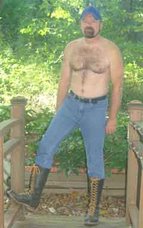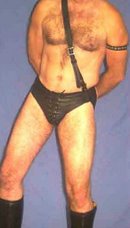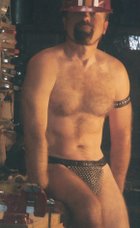The New Gay FictionAfter years of neglect from the mainstream, queer lit undergoes a renaissance
by Edmund WhiteJune 20th, 2006 12:06 PM
At the beginning of the 20th century Rodin said that Americans had just lived through a renaissance and no one in America knew it (he was referring to the advent of painters such as Whistler, Mary Cassatt, Winslow Homer, Thomas Eakins, and Sargent). Something similar could be said about gay fiction right now, which is totally neglected and almost never reviewed by the mainstream press but which has never been more vital. In fact it could be said that gay novels and short stories are among the best being written anywhere now.
Of course there are a few exceptions to the general blackout—the worldwide success of Michael Cunningham's The Hours and the Booker prize–winning novel by Alan Hollinghurst, The Line of Beauty. The action of both of these books, to be sure, takes place outside the gay ghetto and includes many important straight characters; both books belong to what is called "post-gay fiction," a subgenre that David Leavitt may have invented in his first collection of stories, Family Dancing.
The vogue for gay fiction has long since passed after a brief flurry of visibility and celebrity in the late 1970s and early '80s. The market did not respond. Whereas the literature of other minorities (Asian American, African American, Latin American) presents the straight reader with interesting variations on his or her own life by taking up the themes of parenthood, marriage, divorce, adultery, and the intergenerational conflict, the literature of the gay ghetto seems at times utterly alien.
With the collapse of the gay market—and the closing down of gay literary magazines such as Christopher Street and nearly a hundred gay-themed bookstores across the country—gay fiction became invisible, often to the gay community itself. Gay studies as a subject was drying up in the universities (not that gay scholars had ever devoted much energy to contemporary gay creativity). Even the way gay novels are shelved at a bookstore, in a quarantined section labeled "Gay and Lesbian," places a wall around these books that few straight women readers—much less straight men—would have the guts to breach.
Case closed. Except for the inconvenient fact that in the last five or six years gay writers have been turning out some of the most exciting fiction being written today, though it is sold in the small numbers more typical of poetry collections. This spring has seen the publication of an extraordinary novel, John Weir's What I Did Wrong. Weir has written only one other book, The Irreversible Decline of Eddie Socket, which was highly acclaimed in 1989 as a stellar first novel. His new book tells the story of Tom, a middle-aged teacher at a university in Queens, who has lost his lover—a foul-mouthed, impossible, endearing novelist—to AIDS. Tom feeds all his need for love into his charged relationships with his best friend from high school, a drifting straight guy, and with one of his students, an oppressed, apologetic, disenfranchised kid who plays in a rock band and worships Sharon Olds's poetry. This is among other things one of the best books about how ordinary folks live in New York now. His students work at restaurant jobs in Manhasset and blow their salaries at a casino in A.C. They're almost all heterosexuals and Tom studies them as if they were members of another species. "They're outsiders, not pariahs. Their irony is different from mine. The defining crisis for them is their disbelief in other people, while mine is disbelief in myself. Straight guys are conspiracy theorists, wrecked by the knowledge that they can't control the world. Yet I learned early on that I can't control, well, me. I yearn for guys. I am what I want. Straight people aren't asked to justify their yearning. They don't have to boil themselves down to an impulse or an act. Unlike me, they think, 'I am because I want.' "
There are also several recent novels and collections of short stories by younger men that prove the efforts of gay writers to reach out to the world at large. Patrick Ryan's Send Me is about a modest family in the 1970s living near Cape Canaveral in Florida; two of the sons are gay, the older one closeted and the younger one weirdly free of the constraints of the period. This book is full of careful social observation in the manner of Cheever; one of Ryan's stories has been selected for The Best Short Stories of 2005. Actually it's a bit unfair to label it a gay book since so many of the stories are about eccentric if thoroughly heterosexual characters. The first and last chapters in his book, however, are devoted to the younger brother's struggle with AIDS, a theme that lends great depth to a tale of quirky family life. In much of good gay fiction today AIDS plays a role. In Keith McDermott's first novel, Acqua Calda, an older actor with AIDS ventures to Sicily, where he is to participate in an avant-garde theatrical event. During his sojourn he becomes extremely ill but the show must go on and his decision to play his role despite backstage envy and condescension lend him a quiet heroism.
Vestal McIntyre's stories in You Are Not the One are edgy urban tales about young gay men interacting with their straight colleagues at the office or with friends. In one story a young woman decides she needs a gay man in her life (a Will to her Grace, perhaps), but she chooses one who is slippery and ultimately not too friendly. Mack Friedman's Setting the Lawn on Fire is again linked stories that take a young man through a horny, repressed boyhood, up to a summer of canning fish in Alaska and onto a seriocomic career as a hustler. Such a summary does no justice to the elegance and originality of the writing.
Barry McCrea, a young Irish-born Yale professor, has written a rapturous ode to Dublin in his first novel, The First Verse. A gay student at Trinity is manipulated by a strange cult of heterosexuals who use their erotic power over him to induct him into rites and practices of a satanic intensity. More traditional pleasure is provided by Robert J. Hughes's closely woven first novel, Late and Soon, about the art auction business in New York today. It is told from the point of view of a woman whose husband has left her for another man. Now, years later, she becomes friendly with her erstwhile rival, who has in turn been abandoned for a hotter, younger fireman. There are Jamesian delights in the beautiful language and ironies and nuanced psychological observations that Hughes has devised.
I think there is a real phenomenon here, the arrival of a whole new generation of gay writers who've come along to fill the shoes of their predecessors who died too young in the 1980s and '90s. These newcomers are unknown even to most gay men, who are too busy going to the gym and cruising on the Net to read. Whereas being cultured was once the entrance fee for being gay, now the gay community has dumbed down like the rest of the population. But just as the underappreciated American poetry scene is the most vigorous in the world and includes a dozen major figures, everyone from C.K. Williams to John Ashbery, from Louise Glück to Yusef Komunyakaa, in the same way the current gay literary moment is quietly, almost invisibly adding brilliant new names to a canon that is unknown except to the happy few.
Edmund White teaches writing at Princeton and is the author of nearly 20 books, including the recent autobiography My Lives.
Maybe Edmund White is correct in saying that the gay male reader has been dummied down, just like the rest of the reading public to accept fluff. I hope that isn't the case.
I just purchased two gay books that I am beginning to read, The Good Neighbor by Jay Quinn
and Grief by Andrew Holleran. Will let you know my thoughts as I plow through these books.
Subscribe to:
Post Comments (Atom)











9 comments:
Edmund White is sorta correct... not dumbed down as much as overly marketed to a stereotype that watches Queer Eye and Will and Grace. If you want to try an excellent new writer J.G. Hayes "This Thing Called Courage" or his latest one "Now Batting For Boston". He actually writes about working class Gay people that are not fabulous and don't go to college. SURPRISE! Not one misunderstood twinky disco dancing Prada victim in either book.
There are good writers out there it's just too bad that all Gay literary awards seem to go to those who fail to have much to say.
Hey, it's me John Weir, the guy who wrote *What I Did Wrong*, which Edmund White mentions in his piece about new gay fiction. Just wanted to thank you for posting this on your blog. I do think it's true that there are plenty of swell gay writers around who don't get much mainstream coverage. As a friend of mine said, it's really hard to write even a *bad* book - novels are hard to write - and that's compounded by the fact that hardly *anyone* seems to be reviewing new fiction these days, gay or otherwise. If you're already really really famous, like Philip Roth or John Updike, then you get tons of press - which you don't need! Gosh. My book has gotten plenty of attention in the gay press, however, and I'm grateful to find that, despite what everyone says about "gay lit" being over, it does seem that the lesbian/gay community is still interested in keep track of its authors. Edmund White's generous piece is an example of that.
John Weir.
Yearn for guys... I like that, sums the feeling up well. I'll have to remember that when trying to explain the feeling to the hets who thing being gay is a "choice"
I've written some gay fiction...for nifty.org, so you can guess what it's about...hehe.
Jay Quinn's previous book, "Back where he Started" is excellent. I would be curious to hear if this one is as good.
As I read through your post, the first name I wanted to bring up was J.G. Hayes, the imaginative, gritty, honest author of two excellent short story collections about the pain and occasional joys of being gay in socially conservative, Catholic-dominated South Boston. Then I clicked on comments and there was Teddy, bless him, with an appreciation of Joe's work.
I've met Joe Hayes with my gay book group and he's one hell of a guy. He's got a novel close to being finished that will be published. His work is sometimes almost unbearably compelling, as in a powerful story about a group of Southie boys who sneak into a power station to climb an ancient smokestack. You know exactly what's going to happen and you read page after page faster and faster in a kind of fascinated horror--he's THAT good a writer.
And you're not too bad your own self, Buff! This was a wonderful post--thanks.
You must be reading up a storm... no more posts from a top man's perspective??? I live in DC you provide balance from the city's infamous reputation... ;-)
Popular blog. good job. Hot gang.haha
Haven't seen ya blog for a hot minute....hope that means you are having one blast of a Summer!
Post a Comment